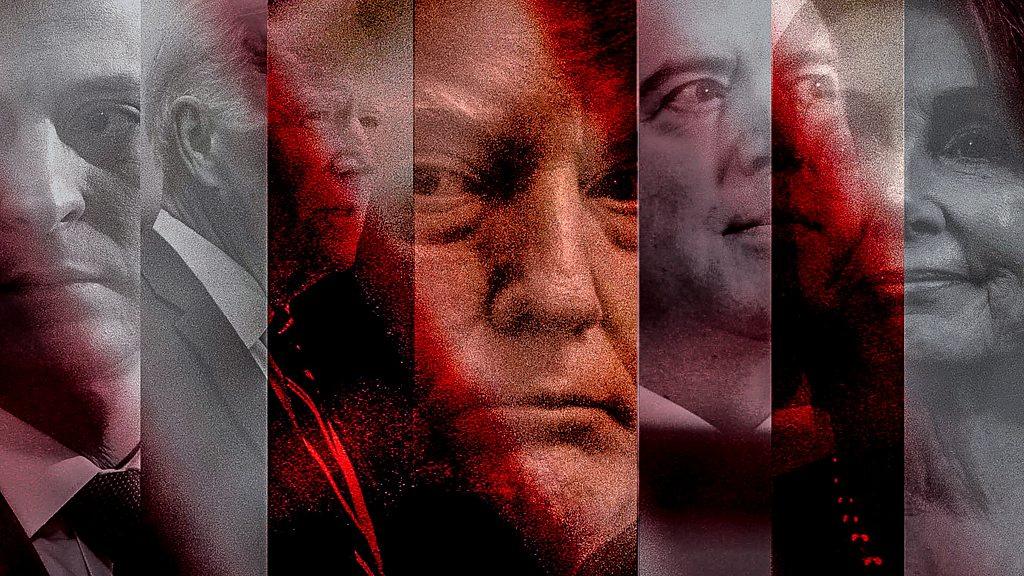Trump says envoy Marie Yovanovitch refused to hang his photo
- Published
This week's impeachment hearings in three minutes
President Donald Trump has pilloried an envoy who testified in the impeachment inquiry, claiming she refused to hang his photo in the US embassy in Ukraine.
Mr Trump told Fox News' morning show former ambassador Marie Yovanovitch "didn't want to hang my picture in the embassy" in Kyiv.
The president did not offer further details about the matter.
Ms Yovanovitch testified last week that she was fired over "false claims" by people with "questionable motives".
She was one of 12 witnesses to testify over the last fortnight in the impeachment inquiry, which may seek to remove the president from office for alleged corruption.
What did Trump say on Fox?
In a phone call to Fox and Friends on Friday morning, Mr Trump defended the removal of Ms Yovanovitch.
"This ambassador, who everybody says was so wonderful," Mr Trump said, "she wouldn't hang my picture in the embassy.
"She's in charge of the embassy, it took, like, a year and a half, two years."
Mr Trump added: "She said bad things about me, she wouldn't defend me, and I have the right to change the ambassador.
"The standard is you put the president of the United States' picture in the embassy," he continued. "This was not an angel, this woman, OK?"
Trump's live-tweets "very intimidating" - Yovanovitch
It was not the first time the Republican president has attacked Ms Yovanovitch.
He lambasted her in a tweet while she was testifying last Friday - a move that Democrats argued amounted to witness intimidation.
Why was Marie Yovanovitch fired?
The 33-year veteran of the foreign service was recalled as the American ambassador to Kyiv in May for reasons that remain murky.
She testified that her anti-corruption efforts had incurred the ire of influential Ukrainians who sought to remove her.
Ms Yovanovitch said she was shocked that her enemies appeared to find allies in the Trump administration, including the president's personal lawyer, Rudy Giuliani.
The former envoy's supporters say she was also smeared by US conservative media voices.
In her testimony, Ms Yovanovitch said the allegation she was disloyal to Mr Trump was false.
Why is Congress investigating Trump?
The US president is accused of withholding US military aid to pressure Ukraine into investigating his domestic political rival.
At the heart of the impeachment inquiry is a phone call on 25 July this year between Mr Trump and Ukraine's newly elected president.
Sondland was involved in a "domestic political errand" for Trump
On the call, Mr Trump urged his counterpart to look into unsubstantiated corruption claims against Democratic White House contender Joe Biden.
Mr Trump's critics say this alleged political pressure on a vulnerable US ally amounted to abuse of power.
What else did Trump say on Fox?
The president spent a significant portion of Friday's television interview discussing a conspiracy theory that it was Ukraine - not Russia - meddling in the US 2016 presidential election.
These claims were branded "a fictional narrative" by one of Thursday's impeachment witnesses, former White House intelligence official and Russia expert Fiona Hill.
She warned elected officials not to promote "politically driven falsehoods" that seek to cast doubt on Russia's alleged interference in US elections.


For almost an hour on Fox News, Donald Trump shared conspiracy theories about Ukrainian meddling in the 2016 US presidential election, again attacked a decorated former US ambassador and suggested a foreign service officer at the US embassy in Ukraine was lying under oath.
And those were just the bullet-point highlights.
It was yet further evidence that the president's take diverges entirely from the testimony of witnesses in the public impeachment hearings and the accounts reported in the mainstream US media.
Mr Trump, for instance, was adamant that a 26 July phone call between himself and Gordon Sondland, the US ambassador to the EU who was in Kiev at the time, "never took place".
It was during this call - confirmed by Mr Sondland himself - that witness David Holmes testified on Thursday that the president asked about Ukrainian "investigations" the day after Mr Trump had told Ukrainian President Volodymyr Zelensky to investigate Democratic rival Joe Biden.
Critics will pick apart the president's comments, but if there's one thing clear after nearly three years of this presidency, when Mr Trump asserts his defence repeatedly and vociferously, his supporters and the Republican party back him up, no matter what fact-checkers may say.

What next with the impeachment inquiry?
After sprinting through seven public hearings with 12 witnesses over five days, the House of Representatives' Intelligence Committee is now writing a report to submit to the Judiciary Committee.
The Judiciary Committee is expected to begin drafting articles of impeachment - which are the charges of wrongdoing against the president - in early December.
After a vote in the Democratic-controlled House, a trial would be held in the Republican-run Senate.
If Mr Trump was convicted by a two-thirds majority - an outcome deemed highly unlikely - he would become the first US president to be removed from office through impeachment.
The White House and some Republicans want the trial to be limited to two weeks.

Learn more about the impeachment inquiry

GO DEEPER: Here's a 100, 300 and 800-word summary of the story
WHAT'S IMPEACHMENT? A political process to remove a president
VIEW FROM TRUMP COUNTRY: Hear from residents of a West Virginia town
ON THE DOORSTEP: A Democrat sells impeachment to voters

- Published20 November 2019
- Published14 November 2019
